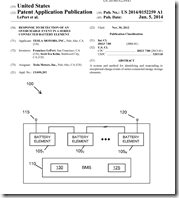 |
| There's plenty of investment dollars to throw around in Africa |
Earlier this week, this Little Leo had the opportunity to attend a meeting titled Accelerating Entry into African Markets arranged by
Afribiz. The purpose of this meeting was mainly to encourage American investors to invest in Africa. Not really applicable to this Little Leo, so she attended more as an interested observer. Investment tends to be in new products and technologies, and where there are new products and technologies, there tends to be IP.
For much of the morning, there was no mention of intellectual property rights. This could be taken as a good thing or a bad thing. It may be that IP is a non-issue because it’s just a given and it is not anymore of a concern for investors or new companies in Africa than anywhere else. Or, the omission could be taken as a bad sign, that IP is such a big problem it isn’t even worth getting into.
Lumkile Monde, the Chief Economist for
Industrial Development Corporation of South Africa (IDC-ZA) spoke about the types of projects IDC-ZA funds across the continent and how the economies of Africa have opened over the past 10 years. Many of the investment areas he mentioned are hot beds of patent discussion, agriculture and hydro-power particularly. He also mentioned the need for skills transfer and capacity development at the government level, two concepts very familiar to anyone following the relationship between African countries and the WTO or the WIPO Committee on Development and Intellectual Property. This Little Leo thought of Mr. Monde’s omission of IP in the talk as a good sign in line with the first option above.
Kendal Tyre, Chair of Nixon Peabody’s Africa Practice and US National Representative for
LexNoire (an African Diaspora legal network), talked about considerations for mergers and acquisitions in Sub-Saharan Africa. Another topic that in practice should be rich with IP issues, transfers of IP assets, licensing, etc. Yet, there was only one almost-mention of it when Lauri Elliot, CEO of AfriBiz piped in to explain that African countries do have legal systems with regulations and requirements, same as US does, and Americans can’t just “go in and do it.” IP laws are definitely part of these existing regulations and requirements.
Ms. Elliot also had the following presentation where she discussed how to leverage cities to do business in Africa. A huge part of this was the importance of face-to-face relations in most cultures on the continent, the needed ability to easily travel to other areas and the concentration of resources and labor found in cities. Another benefit to leveraging cities that Ms. Elliot did not mention but is relevant to IP is to be near the agencies, commissions and ministries that handle registration and enforcement of IP rights. It’s often much easier to get things done when you can go talk to the person who needs to do it.
The fourth speaker provided some excellent encouragement that the non-focus on IP was a symptom of good news and not bad. The head of Business Development for the IDC-ZA talked about the strategic project opportunities – remember, much of the goal here seemed to be to get American investment dollars into Africa. When he talked about the four largest areas for exportation of companies, two of them were IP sectors: design and branding. The idea that these industries are top exporters suggests that the intellectual property assets involved have adequate protection to be traded.
Mr. Kipkosgei Toroitich, the Second Secretary of Protocol & Trade from the
Kenyan Embassy in Washington, DC also seemed to support the idea that protection of IP rights is not a major concern. He pitched Kenya as the ideal place to invest, and in his list of benefits the country has to offer inventors, did not mention anything about strength of IP rights. This could suggest investors don’t see this as a concern that needs to be reassured.
Mr. Ben Todd of the
US export-import bank (US EXIM Bank) continued the in-attention to IP as he discussed how the EXIM bank provides capital to companies needing to purchase US exports. Africa is the largest growing portfolio for the bank and the bank has had a government mandate since the 1990s to focus on Africa. Again it seemed IP just wasn’t seen as a road block.
And then the
US Department of Commerce got up to speak and shattered this Little Leo’s excited dreams that perhaps we’d finally gotten past the ‘lagging-Africa’ stereo-type. In his list of challenges to doing business on the continent, there it was “IP Rights,” a concern for both US and African companies, particularly in the area of counterfeiting. Le sigh.
Little Leo may be optimistic but is not foolish. We all know that there are challenges and debates surrounding the implementation of IP Rights, the trade-offs, the relationship to trade and other international support and we could carry on for days discussing why. But this time she was hoping for some recognition for what does work and respect for the discussions that have happened and decisions that have been made. Perhaps it is best to take lack of IP talk from the many other speakers, including the
US Trade and Development representative who spoke later, as a sign of movement towards this hoped for goal. Recognition by omission? It could be a start.

 South Africa now has its own version of the Creative Commons 3.0 licenses. Launched last week, the ZA 3.0 suite is the very final suite of 3.0 Creative Commons licenses to be adapted to a specific country. It is the third suite of 3.0 Creative Commons licenses on the continent, joining Uganda and Egypt.
South Africa now has its own version of the Creative Commons 3.0 licenses. Launched last week, the ZA 3.0 suite is the very final suite of 3.0 Creative Commons licenses to be adapted to a specific country. It is the third suite of 3.0 Creative Commons licenses on the continent, joining Uganda and Egypt.

















